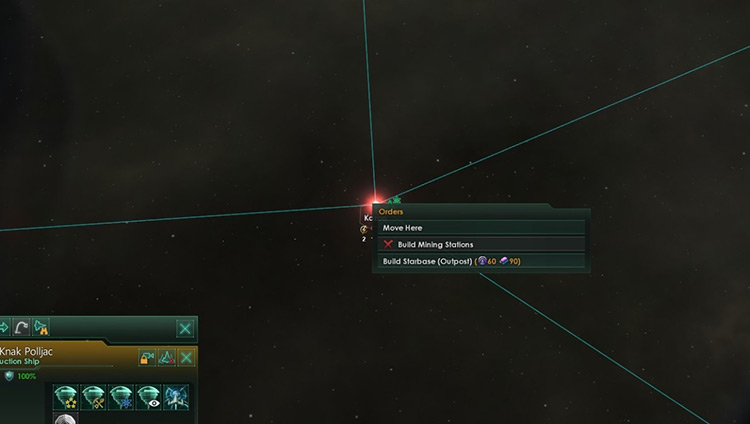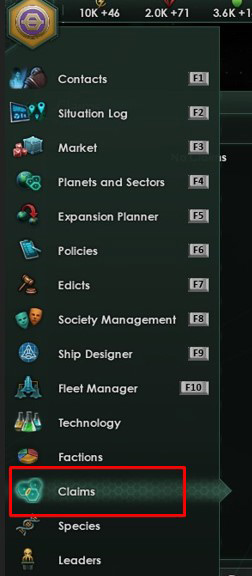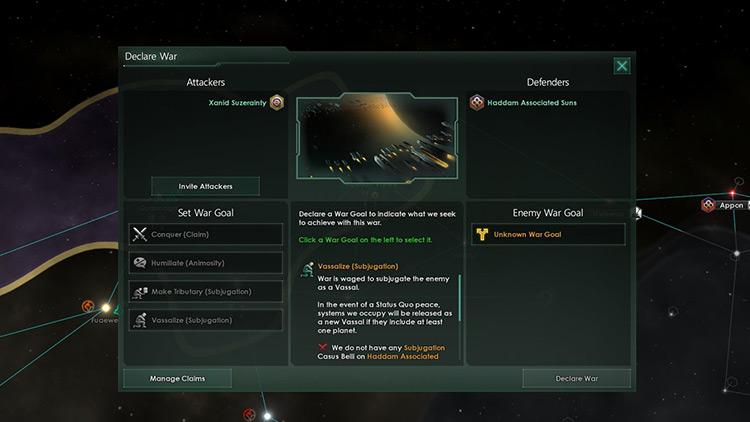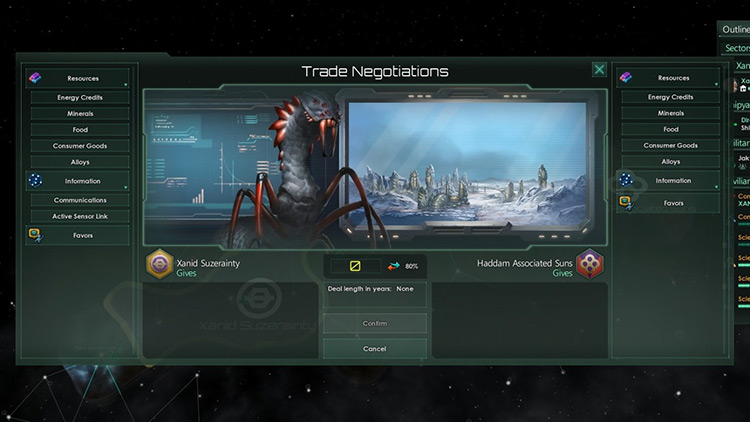Expansion can be done through building Outposts, through trade, through integrating subject empires, and of course, through war. Understanding how you should expand based on where you are in the game can help maximize your gains and eventually lead you to victory. Note: Border expansion works differently now compared to the release version. This guide assumes you are playing Stellaris at version 2.0 or later.
Why Borders Matter in Stellaris
Simply put, borders in Stellaris are a visual indicator of how far your territory, hence your control and influence, reaches. Having a star system in your territory means you can exploit its resources, population, and maintain sensory intel on it at all times.
Colonization
Borders also play a vital role in Colonization. As you establish your Colony, the planet becomes easy prey for enemy fleets. In fact, just a few in-game days of bombardment can destroy it, effectively wasting resources. Maintaining a strong buffer zone within your territory can make establishing Colonies much easier.
Travel
Travel within your empire’s borders is also much easier compared to travelling outside your territory. Your ships wouldn’t have to worry about hostile fleets or starbases along their routes. They also wouldn’t have to worry about FTL Inhibitors slowing them down.
Restricting Rival Empires
You can also control who gets to travel through your empire by selectively opening or closing your borders for different neighbors. You can essentially isolate a rival empire if you setup your borders smartly. There are a lot of ways you can go about playing Stellaris. But regardless of your playstyle, how you expand or take care of your borders will play a vital role in achieving victory.
Expansion Through Outposts
The most common way to expand your borders, especially in the early to mid-game, is by building Outposts in unclaimed star systems. At the start of the game, you should already have what you need to expand this way, namely the Construction Ship and the Science Ship for surveying. With that said, here is how you build Outposts:
Expansion Through War
Although Outposts are a good way to expand your territory at the start, eventually, finding unclaimed systems will become harder the closer you get to the mid-game. You will know if a star system is fully-surveyed if its name on the Galaxy Map is white, rather than gray. Note: The Influence cost increases with each hyperlane jump from your nearest owned star system. If it’s 2 jumps away, for example, you will have to pay 225 Influence instead. Eventually, every star system not within your territory will belong to someone else. Of course, that doesn’t mean your border expansion ends there. Another way to expand your borders is by making a claim on star systems owned by other empires and fighting a war to annex them.
Making Claims
If you want to expand your borders through war, you will need to make a claim on the occupied system first. These territorial claims will play a key role during war. If you win the war, that is, if you achieved all of your War Goals, then you will automatically annex any system you’ve made a claim on. Here is how you make claims: Note: You don’t have to go to war immediately after making your claims. But making claims will sour relations with the empire who owns the system.
Strengthening your Claims
You can claim a system more than once. This strengthens your claim to it. A stronger claim means the territory will transfer to you instead of your ally if there are multiple participants in the war. Note: If the number of claims is the same for all empires involved, then the oldest claim is considered the strongest.
Declaring War
Once you’ve made your claims, and you’ve exhausted all diplomatic options, then it’s time for war. For an empire to declare war, they will need a Casus Belli, or a reason to go to war. Since you’ve made claims, then you should already have the “Conquer” Casus Belli, but there are numerous other Casus Belli available in Stellaris. Each Casus Belli will have different War Goals, which offer different results for both sides of the conflict, whether they win or lose, or if it’s considered a draw. To declare war: If you win the war, or you’ve forced your opponent to surrender, then any systems you’ve made claim to will automatically be transferred to you.
Expansion Through Vassals
If war isn’t your thing, then there are other ways you can absorb a rival empire’s territory peacefully. You can do this by subjugating the empire in question or making them into your subject and integrating them. In order to make an empire a subject, you will need to have a superior relative power compared to them. They also need to have a positive attitude towards you. Note: You can still subjugate empires through war using the Subjugation War Goal.
Integration
If your subjugation is successful, you become the overlord of the empire in question. Once 10 in-game years have passed without your subject empire gaining independence, you will have the option to integrate them. If successfully integrated, all the subject empire’s planets, star systems, and ships will transfer control to you.
Expansion Through Trade
Another peaceful way to gain territory is by trading, or effectively buying star systems from rival empires. Just like subjugation, trading star systems is much easier if you have a positive relationship with the empire in question. You may also need a lot of accumulated favors from them.






